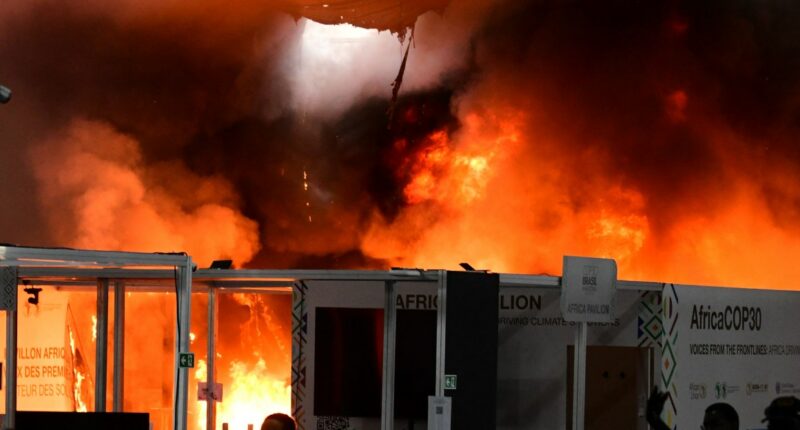Share this @internewscast.com
“It’s a wrap… Don’t forget to buy an ‘I survived Belém’ shirt,” began an email I received on Saturday, marking the conclusion of the eagerly awaited United Nations climate negotiations in Belém, Brazil. The email came from Shravya Jain-Conti, the US climate diplomacy lead at the Global Strategic Communications Council (GSCC), a veteran observer of these events. While her updates often include handy tips like where to find the best coffee, the T-shirt suggestion was an unexpected first.
Over the past year, I have been contemplating these climate talks, considering ways to fund a reporting trip to Belém. Ultimately, I chose to cover the story from the US, avoiding the journey into the Amazon while pregnant during a federal government shutdown. My reluctance to miss out turned into relief last week when a fire broke out at the UN event venue, coinciding with a disappointing conclusion to what many had hoped would be pivotal climate discussions since the 2015 Paris Agreement.
The two-week discussions concluded on Saturday, marked by debates over transitioning from fossil fuels, which are central to climate change. Named COP30, this “Conference of the Parties” involved delegates from over 190 nations under the UN Framework Convention on Climate Change, and was touted as the “Implementation COP.” The focus was to solidify the commitments made to combat global warming and adopt cleaner energy solutions.
Despite the emphasis on “implementation,” the event faced significant setbacks.
Expectations were high, but the rise of nationalist sentiments worldwide poses challenges to global cooperation on climate issues. The conference ended with renewed vows to address climate change later and urged countries not to abandon the process.
Just after the talks concluded, I received a WhatsApp message with a statement from Mary Robinson, former President of Ireland and a fierce advocate for climate action, via GSCC. Robinson acknowledged, “This deal isn’t perfect and is far from what science requires,” adding, “But in a time when multilateralism is under strain, it’s crucial that countries continue to advance together.”
For an event all about “implementation,” quite a bit of planning went awry. Belém is considered a gateway city to the Amazon, and holding the conference there was initially expected to highlight the important role forests like the Amazon play in fighting climate change by trapping planet-heating carbon. But to host some 50,000 attendees, officials bulldozed forest to pave a new highway and brought in massive diesel-burning cruise ships as temporary accommodations for visitors.
Indigenous demonstrators that rely on those forests and protect them led protests to call out some of the hypocrisy and demand a stop to resource extraction and deforestation that destroys their lands. At one point, protesters clashed with security to gain access to the venue, some carrying signs that read “our forests are not for sale.” A few days later, members of the Munduruku people from the Amazon Basin and their allies formed a human blockade outside the COP entrance to demand stronger protections for forests and their territories.
There was a record number of Indigenous participants at this year’s COP. But that was also true for fossil fuel lobbyists, who outnumbered every country’s delegation at the event except for Brazil.
Maybe it was some kind of poetic justice (but probably caused by an electrical issue) — on Thursday, a day before the conference was scheduled to come to a close, a brief blaze broke out in the venue and burned through the roof. The evacuation stalled negotiations for hours. And while COP meetings often run into overtime, there was added pressure this year to wrap things up before those cruise ships were scheduled to set sail Saturday.
The conference indeed closed up shop on Saturday, and two major initiatives that started to take shape at COP had fallen by the wayside. More than 80 countries had shown support to formalize a “roadmap” for transitioning away from fossil fuels. And 90 nations came together to call for another roadmap to ending deforestation. The formal agreement that came out of this year’s conference doesn’t even mention fossil fuels or deforestation. The consolation prize, I suppose, is that COP30 president André Corrêa do Lago pledged to continue working toward creating those roadmaps through next year.
There were other tepid steps taken in Belém. Brazil recognized 10 new Indigenous territories. Billions of dollars of additional funding were pledged for forest conservation and climate adaptation projects, although far less than what many attendees say is needed. Environmental advocates celebrated a “Just Transition Work Program,” an agreement meant to ensure that the deployment of carbon-free energy is more equitable and that it centers human rights.
But the fossil fuel industry notched their own win by delaying the roadmap to tamp down coal, oil, and gas use. The federal government of the US, the world’s biggest oil and gas producer, decided to skip the talks entirely this year as the Trump administration tries to ramp up fossil fuel production — a move that took the pressure off other oil- and gas-producing nations.
“While we welcome strengthened provisions on the Just Transition Work Program, these wins at COP30 are decisively tempered by the disappointing omission of any reference to fossil fuels in the final text,” Ife Kilimanjaro, executive director of the US Climate Action Network, said in a press release. “Failing to name and address the climate crisis’ root cause undermines the credibility of the entire process.”








